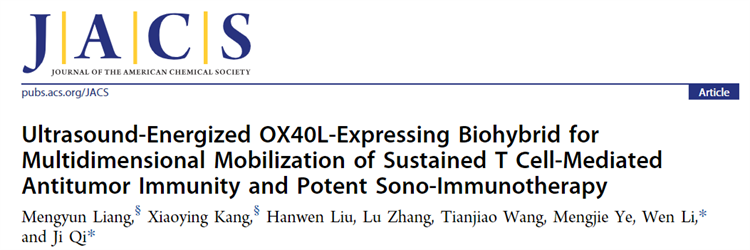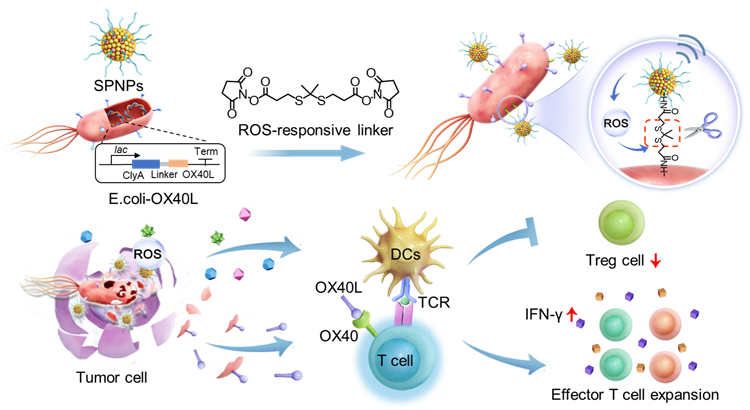Nankai University Team Develops Genetically Engineered Bacteria-sonodynamic Synergistic System to Enhance the Effect of Tumor Immunotherapy
Recently, a Nankai University research team has made important progress in the research on sonodynamic immunotherapy of tumors. They have developed an ultrasound-energized intelligent biotherapeutic system combining genetically engineered bacteria with polymeric sonosensitizers, aiming to trigger a multidimensional immune cascade for potent antitumor immunotherapy. The research findings were published in the Journal of the American Chemical Society (JACS).

Costimulatory signals play a key role in the activation and functional regulation of T cells. The OX40/OX40L costimulatory pathway plays a core regulatory role in the adaptive immune response by promoting T cell proliferation, survival, and memory differentiation. In recent years, bacteria have emerged to become a promising tumor-targeted delivery platform for their natural immunogenicity and tumor colonization capacity. Leveraging synthetic biology techniques, genetically engineered bacteria can be designed to efficiently express therapeutic molecules, broadening their application prospects in tumor treatment. Sonodynamic therapy, a non-invasive treatment modality, harnesses ultrasound to activate sonosensitizers to produce cytotoxic reactive oxygen species that directly kill tumor cells. Additionally, SDT can induce immunogenic cell death, promoting the release of tumor-associated antigens and damage-associated molecular patterns (DAMPs). This process promotes the recruitment and activation of antigen-presenting cells, ultimately activating T cell-mediated anti-tumor immune response. The synergistic application of these therapeutic strategies offers a new paradigmfor tumor immunotherapy.
The research team innovatively combines genetically engineered bacteria encoding the costimulatory molecular OX40 ligand (OX40L) with a novel sonosensitizer to develop an ultrasound-energized intelligent biotherapeutic system. Upon ultrasound irradiation, this platform enables spatiotemporally controlled separation of the sonosensitizers and engineered bacteria while simultaneously inducing immunogenic cell death (ICD) in tumor cells, initiating the primary activation of T cells. The OX40L expressed by the genetically engineered bacteria specifically binds to the OX40 receptor on the surface of activated T cells. This significantly promotes the clonal expansion of T cells and maintains their effector function, thereby establishing a cascade immune response process of “initial activation - signal amplification - long-term maintenance”. This innovative biotherapeutic hybrid platform offers a new paradigm for multidimensional immune activation and the development of highly effective sono-immunotherapy strategies against tumors.

Ultrasound-energized OX40L-encoded genetically engineered bacteria achieve multi-dimensional T cell-mediated anti-tumor immunity and high-efficiency sonodynamic immunotherapy
Professor Qi Ji in the State Key Laboratory of Medicinal Chemical Biology and College of Life Sciences of Nankai University and professor Li Wen in the Chinese Academy of Medical Sciences are the corresponding authors. Liang Mengyun and Kang Xiaoying, doctoral students in Nankai University, are the co-first authors of the paper.
Link:
https://pubs.acs.org/doi/10.1021/jacs.5c02025
(Edited and translated by Nankai News Team.)









